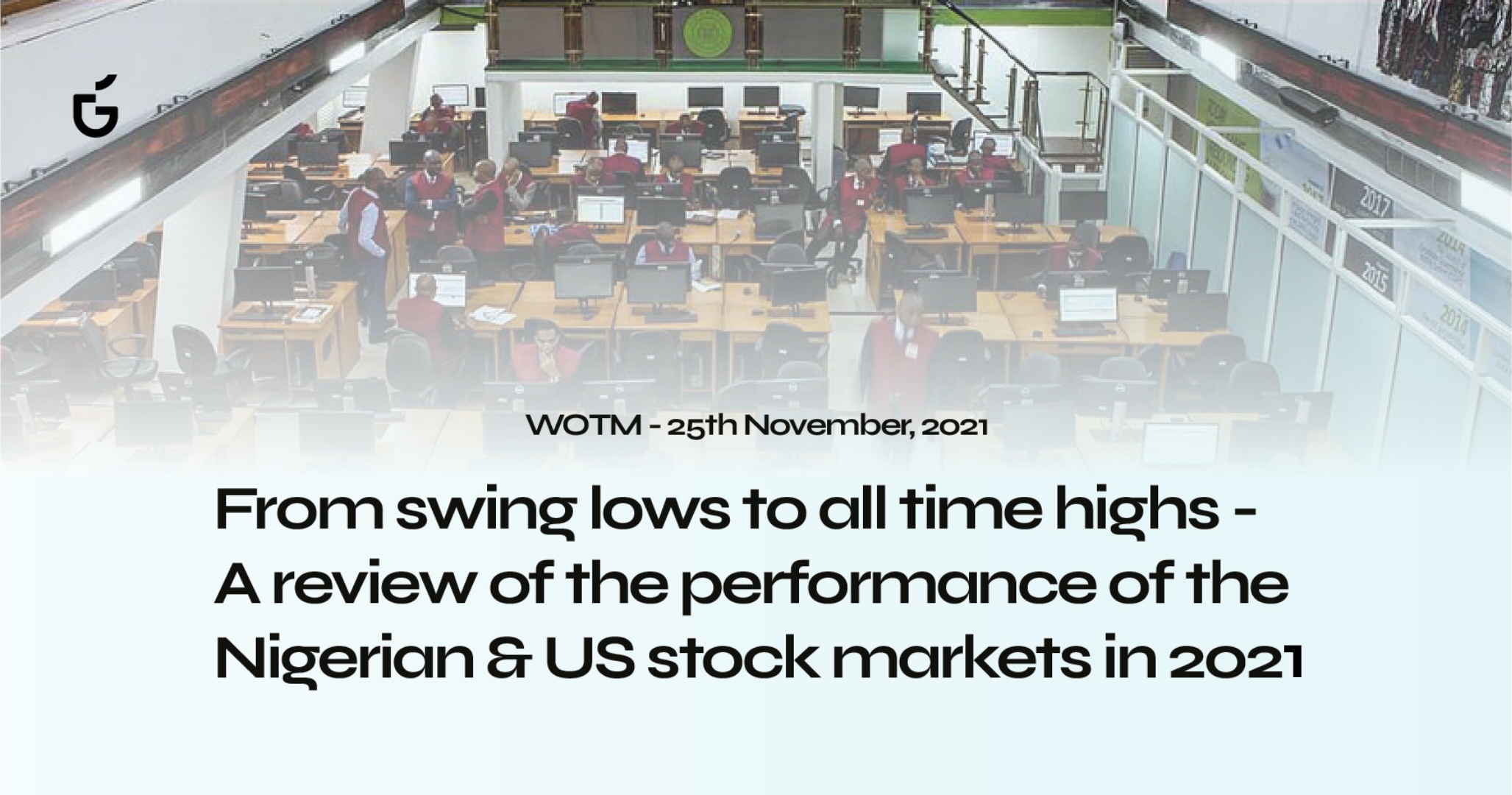 Africa
AfricaUnderstanding how companies are valued – A look into the MainOne acquisition
15 December, 2021
08 July, 2021 | 4 MINS READ
The Story
On Thursday the 1st of July 2021, Robinhood, the popular mobile stock trading application, filed for an Initial Public Offering (IPO) with the Securities and Exchange Commission (SEC) . The company is looking to raise $100mn at the IPO. After the IPO, the shares will be listed on NASDAQ with the ticker “HOOD”.
What is an IPO and Why is Robinhood Having One?
An IPO is one of the ways businesses raise capital to fund expansion projects. An IPO is a situation in which a business chooses to list some of its shares on an exchange for the first time to raise capital. To achieve this, the company must register with the exchange it intends to list on and the Securities and Exchange Commission (SEC). With the help of an investment bank, the value of the business and a price at which it will trade is determined and at the completion of its registration, it starts to trade on an exchange and becomes accessible to everyone.
There is a wave of IPOs currently sweeping through financial markets. Earlier on in the year, we saw Coinbase a cryptocurrency exchange list on the stock market. According to the New York Times, in the just concluded week, about 18 companies were expected to go public. Robinhood’s listing is part of the wave of IPOs. We also opine the company’s listing provides a means for venture capitalists who provided funding for the company since inception in 2013 to exit. Robinhood has so far raised $4.5bn in 7 rounds of founding.
What you should know about Robinhood
Robinhood is a stock trading app that aims to democratize finance. The company began operations in 2013, but officially launched its app in March 2015. The company has so far been disruptive. Its zero-commission stock trading feature forced the big wigs in the brokerage sector to remove their fees and commissions on trading.
Robinhood currently has about 19million users, 6 million of those signed up in the first 2 months of 2021. The pandemic played a major role in the growth of Robinhood, restricted movement and government stimulus checks drove retail traders to the use of the app. In the first half of 2020, Robinhood was the 4th most downloaded app according to Sensor Tower.
Users on the app have an average account size of $3,500 compared to an average of $100,000 on E-trade and $240,000 at Charles Schwab. The introduction of the Robinhood app has expanded the retail segment of investors in financial markets. And contrary to popular believe that retail investors are naïve, research by a professor of finance at UCLA showed that users of Robinhood took advantage of the bear market of March 2020 and earned reasonable profits when the market turned bullish. In a period of 3 years (2018 – 2020), research showed that they earned solid returns.
As of February 2021, Robinhood was valued at $40bn. At the filling of documents for the IPO with SEC, Robinhood also made available its Q1 2021 financial results. This result showed revenue of $420mn and a loss of $1.4bn. The loss was attributed to the convertible debt the company raised earlier in the year.
Though the company has been able to grow the use of the app, it had to contend with regulatory fines and various lawsuits. On Wednesday, last week the company announced that it would pay a fine of $70mn to Financial Industry Regulatory Authority (FINRA) for misleading customers and harming them with outages. Back in January 2021, the company stopped trading on the app when a group of retail traders pumped up the price of Game Stop. This drew a lot of negative reactions, and the company was slammed with close to 50 lawsuits.
Should I buy Robinhood at the IPO?
To make a decision on if to buy Robinhood during IPO, one of the first things to identify is the company’s sources of income and how likely it is the company will remain profitable.
Robinhood’s biggest income earner is its payment for order flow which is a system through which large financial institutions (who match buyers and sellers to conduct a trade) pay Robinhood to send them trades. Though Robinhood also makes money by earning interest on uninvested funds kept in user’s accounts and a subscription fee from users signed to its Robinhood Gold, its main revenue driver is tied to volume. The more active users it has, the more money it makes from order flow.
The company has been able to grow its users significantly over the years, however, the question remains, can it continue in that stride going forward? Will the stock market always be in the investor’s favor? Financial markets move in cycles, what happens when the stock market is in an extended bearish mood? Will Robinhood still be able to grow and keep its existing users active? These are the questions you need to ask.
You also need to look out for the competition in the brokage sector where Robinhood operates. After Robinhood launched its commission free trading, several other brokerage firms followed suit. Though Robinhood has added some features like fractional shares, crypto trading, and recurring investment to its app, it still lacks the diversity of product offering most traditional brokers have. It does not have the option of a retirement saving account, nor a mutual fund or even bonds.
It is also important to state at this point that Robinhood is doing something quite different with its IPO. It is reserving up to 35% of the shares to be listed for retail traders to buy on its app via an IPO access feature. This is giving retail traders an advantage usually given to institutional investors, allowing a larger percentage of retail investors own the stock. This is truly democratizing finance and putting retail investors first.
The company has however cautioned that this could cause price volatility after its listing. Retail investors typically hold stocks for shorter periods of time than institutional investors. Given that a large percentage of the company’s shares will be in the hands of retail investors, the stock could be on its way to becoming a meme stock.
All of these factors, including your willingness and ability to take risk should be put into consideration before deciding to participate in the IPO.
Other IPOs to look out for in 2021.
Nerd Wallet: Nerd Wallet started out in 2009 as a website that helped people with their credit cards, The company has however grown to cover different aspects of personal finance. It presently generates revenue of over $150m and has over 100mn users. The company is expected to go public in the later part of 2021.
Next Door: This company was founded in 2008. It is a social network that operates in neighborhoods. It helps people living in the same neighborhood connect and it allows sending out or receiving recommendations, referrals, organizing events, posting alerts, and selling. This app is in use in 11 countries across 268.000 neighborhoods.
Stripe: Stripe is a payment processing software company. Though it is not yet certain. investor anticipate it will go public within the next 2 years. The company is valued at about $95mn.
 Africa
Africa15 December, 2021
 Africa
Africa09 December, 2021
Join the biggest
investment club in Nigeria.